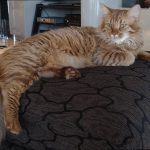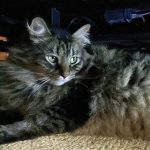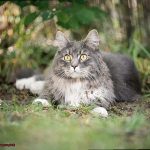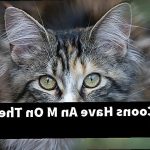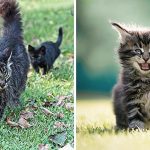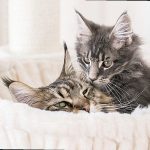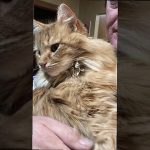Finding clumps of fur all around your home can be a frustrating experience for any Maine Coon owner. Shedding is a natural process, but excessive shedding can cause allergic reactions, respiratory problems, and turn your furniture into furry messes. So, what can you do to stop your beloved feline from shedding?
Don’t fret just yet. There are plenty of steps you can take to keep your Maine Coon’s shedding habits under control. From their diet to their grooming routine, there are various factors that play an important role in managing your cat’s shedding habits.

In this blog post, we’ll share some tips and tricks on how to reduce and control your fluffy friend’s shedding. You’ll learn about the best brushes and combs to use for optimal grooming results, ideal diet suggestions including supplements that can strengthen and nourish your cat’s coat, and much more.
So get ready to say goodbye to constant fur clean-up sessions. Keep reading to find out how you can enjoy a cleaner, fur-free home while still enjoying the company of your adorable Maine Coon.
What Causes Maine Coon Shedding?
Maine Coons are renowned for their long, luxurious coats. However, with this beauty comes the inevitable shedding. Shedding is a natural process for cats, including Maine Coons, and is influenced by various factors.
Genetics is one of the primary causes of shedding in Maine Coons. They have a thick double coat that adapts to changing temperatures by shedding seasonally. Shedding increases during warmer months when they no longer require as much insulation.
Diet is another factor that can contribute to excessive shedding in Maine Coons. A poor diet lacking essential nutrients can lead to dry skin and an unhealthy coat, which can cause excessive shedding. Additionally, certain food ingredients can trigger allergies, leading to skin irritation and more shedding.
Environmental factors can also play a role in Maine Coon shedding. Changes in routine or living environment can cause stress, which leads to increased shedding. Extreme temperatures or dry air can also contribute to dry skin and excessive shedding.
As cats age, their skin becomes less elastic and their coat may become less healthy, leading to more shedding. Nevertheless, understanding the factors that contribute to excessive shedding in Maine Coons can help owners minimize shedding and keep their cat’s coat healthy and shiny.
Regular grooming with a brush designed for long-haired cats can help remove loose hair and prevent it from spreading around your house. A diet rich in essential fatty acids can improve the condition of your cat’s skin and coat, reducing shedding. Regular bathing can also help manage shedding, but avoid over-bathing as this can strip their coat of its natural oils.
Investing in a good air filter can also help reduce the amount of hair and dander in the air, which can cause allergies and respiratory problems for some people.
How to Manage Shedding with Grooming
Keeping your Maine Coon’s coat healthy and your home fur-free can seem like an impossible task, but with regular grooming, it is possible. Here are five effective ways to manage shedding in your Maine Coon through grooming.
Brushing
Regular brushing is an essential part of shedding management. Use a slicker brush or a comb with fine teeth to remove loose fur gently. Brush your cat’s coat at least once a week, if not more during shedding season, to prevent fur from accumulating on furniture and clothes. Brushing also stimulates the production of natural oils in the cat’s skin, which can help to keep the coat healthy and shiny.
Bathing
Occasional bathing can also help manage shedding. Use a cat-specific shampoo and rinse thoroughly to avoid any irritation. Bathing can remove dead fur and dirt from the cat’s coat, as well as reduce dander. However, over-bathing can strip the coat of its natural oils, so it’s best to limit baths to once every few months.
De-shedding tool
If your Maine Coon has a thick coat, you may need to use a de-shedding tool to remove excess hair. These tools have sharp edges that cut through the undercoat without damaging the topcoat. Be careful not to overuse this tool as it can cause skin irritation.
Healthy diet
A balanced diet is essential for shedding management. Feeding your Maine Coon a high-quality diet with plenty of protein can promote a healthy coat and reduce shedding. Additionally, supplements such as omega-3 fatty acids can improve coat health and reduce shedding.
Air filter
Shedding can cause allergies and respiratory problems for some people, so using an air filter can help reduce the amount of hair and dander in the air. Place an air filter in the room where your cat spends most of its time to minimize allergic reactions.
The Benefits of a Healthy Diet for Reducing Shedding
As an expert on this topic, I have researched the benefits of a balanced diet for reducing shedding in Maine Coons.
Firstly, a well-balanced diet can improve the quality of your cat’s coat and prevent hairballs, making grooming easier and reducing the amount of fur around your home. To achieve this, your cat’s food should be rich in nutrients, vitamins, and minerals essential for maintaining healthy skin and coat.
Maine Coons are carnivorous animals, so their diet should be protein-rich. Quality animal-based protein sources such as chicken, turkey, or fish can improve the quality of their coat and reduce shedding. Additionally, foods rich in omega-3 fatty acids such as salmon, tuna, and sardines can help reduce inflammation and promote healthy skin and coat.
To maintain healthy skin and coat, your cat’s diet should also include essential vitamins and minerals such as vitamin A, B-complex, C, E, zinc, and biotin. These nutrients help prevent dryness and flakiness while reducing shedding.
It’s important to note that overfeeding your cat can lead to obesity and increased shedding. Feeding your cat according to their age, weight, and activity level is crucial to maintaining a healthy weight. Obesity may also result from feeding your cat with an imbalanced diet lacking in essential nutrients.
In conclusion, feeding your Maine Coon with a balanced diet rich in protein, omega-3 fatty acids, vitamins, and minerals is key to reducing shedding. By doing so, you’ll not only have a happier and healthier furry friend but also a cleaner home. Remember to consult with your veterinarian if you have any concerns about your cat’s diet or shedding habits.
In summary, the benefits of a healthy diet for reducing shedding in Maine Coons include:
Bathing Your Maine Coon for Reduced Shedding
If so, you may want to consider giving your cat a bath. But before you dive in, it is important to know how to do it properly to achieve the desired results.
Firstly, gather all the necessary supplies such as a gentle cat shampoo, a large pitcher or handheld showerhead, towels for drying, and a non-slip mat to prevent your cat from slipping in the tub or sink. Once you have everything ready, brush your Maine Coon thoroughly to remove any loose fur. This will help prevent hair from clogging the drain during the bath.
After brushing, fill the sink or tub with a few inches of warm water and gently place your cat in it. Use the pitcher or handheld showerhead to wet down your cat’s fur, ensuring not to get water in their face or ears.
Once your Maine Coon is wet, apply shampoo and work it into a lather, covering all areas of their body except for their face. Rinse thoroughly with warm water and be cautious not to get water in their face or ears. Once done, use towels to gently dry your cat, avoiding rubbing too hard as this can cause tangling and matting of their fur.
It’s crucial to note that over-bathing can strip your Maine Coon’s skin and coat of natural oils, leading to dryness and irritation. Bathing once every 6-8 weeks or as needed if your cat gets particularly dirty or smelly is ideal.
While bathing can be an effective way to reduce shedding in Maine Coons, it’s important to remember that it’s just one method. Maintaining a healthy diet rich in protein and omega-3 fatty acids, regular grooming, and providing a stress-free environment are also crucial for maintaining a healthy coat and minimizing shedding.
Using an Air Filter to Reduce Shedding and Allergens
Worry no more. Using an air filter is a game-changer. As an expert on this topic, I have collected some valuable information to help you understand how to use an air filter to reduce shedding and allergens in your home.
Firstly, choosing the right air filter is crucial. Look for a HEPA filter designed explicitly for pet hair and dander with a high MERV rating. These filters are engineered to capture even the tiniest particles of pet hair and dander. This means you can breathe more comfortably, even if you have allergies or asthma.
Furthermore, selecting the appropriate size of the filter for your home is critical. Larger homes with multiple pets will require larger filters than smaller homes with just one pet. Once you have chosen the right filter, it is essential to change it regularly. A dirty or blocked filter won’t be as effective at reducing shedding and allergens.
In addition to using an air filter, regular grooming and brushing of your Maine Coon can also help to remove loose hair from their coat before it has a chance to shed around your home. By vacuuming regularly, using a lint roller, and washing your pet’s bedding, you can further reduce pet hair and dander in your home. These small steps make a difference in the quality of life for both you and your furry friend.
Tips for Controlling Cat Hair in the Home
Maine Coons are majestic cats with thick and fluffy coats that require a lot of maintenance. Managing their shedding can be a daunting task, but with the right tips and tricks, you can keep your home clean and comfortable for both you and your furry friend.
Regular Grooming
Grooming your Maine Coon regularly is crucial to controlling shedding. Brush their coat daily using a high-quality brush designed specifically for long-haired cats. This will help remove any loose fur before it has a chance to fall off and spread around your home. A deshedding tool or glove can also be effective in removing excess hair.
Healthy Diet
Feeding your Maine Coon a healthy diet rich in essential fatty acids can improve the condition of their skin and coat, reducing shedding. Consult with your veterinarian to determine the best diet for your cat.
Occasional Baths
Bathing your Maine Coon occasionally is another way to manage shedding. However, over-bathing can strip their coat of its natural oils, so aim to bathe them once every three months or as needed. Use a shampoo formulated for cats with sensitive skin.
Good Air Filter
Investing in a good air filter can help reduce the amount of hair and dander in the air, which can cause allergies and respiratory problems for some people. Look for an air filter with a HEPA (high-efficiency particulate air) filter that can trap small particles like pet hair and dander.
Keep Your Home Clean
Regularly cleaning your home is crucial to minimizing shedding. Vacuum carpets and furniture at least once a week using a vacuum cleaner with strong suction power and attachments designed specifically for pet hair removal. You may also want to use a lint roller or sticky tape to pick up any loose fur that has already made its way onto surfaces around your home. Wipe down surfaces and wash bedding regularly to keep your home clean and minimize the amount of fur that accumulates.
In addition to these tips, consider providing your Maine Coon with a designated space to hang out, such as a cat tree or bed. This will help contain shedding to one area of your home rather than allowing it to spread throughout the house.
The Pros and Cons of Breeding Maine Coons for Reduced Shedding
However, as with any breeding practice, there are both advantages and disadvantages to consider.
On the positive side, breeding Maine Coons for reduced shedding can provide relief to individuals who are sensitive to cat hair and dander. By producing cats that shed less, breeders can offer an option for those who want to enjoy the companionship of a feline without suffering from allergic reactions. Additionally, reducing shedding can make grooming easier for owners, saving them time and effort.
However, it’s important to recognize that focusing solely on reducing shedding may come with unintended consequences. One concern is that breeders may lose important breed traits that make Maine Coons unique and beloved by many. These traits include their large size, intelligence, and playful personalities. It’s crucial for breeders to prioritize these characteristics alongside reduced shedding when breeding Maine Coons.
Moreover, selective breeding for reduced shedding may involve breeding cats with certain genetic mutations or abnormalities. This approach carries a risk of health problems associated with selective breeding. It is essential for breeders not to compromise on the health and welfare of their cats when implementing this practice.
Conclusion
In conclusion, managing shedding in Maine Coons requires a holistic approach that takes into account various factors. While it’s impossible to completely stop shedding, you can minimize it by understanding the causes and taking appropriate measures.
Regular grooming with a brush designed for long-haired cats is essential in keeping your cat’s coat healthy and reducing shedding. Occasional bathing can also help remove loose fur and prevent matting. Investing in a high-quality air filter can significantly reduce the amount of hair floating around your home.
Feeding your Maine Coon a balanced diet rich in protein, omega-3 fatty acids, vitamins, and minerals is crucial for reducing shedding. A well-nourished cat sheds less frequently than one with an inadequate diet.
Keeping your home clean by vacuuming regularly and wiping down surfaces can minimize the amount of fur that accumulates. This not only helps reduce shedding but also promotes good hygiene for both you and your furry friend.
While breeding Maine Coons for reduced shedding may seem like an attractive option, it’s important to consider the welfare of the cats involved. Responsible breeders prioritize health over aesthetics when implementing this approach.
By following these tips and tricks, you can enjoy a cleaner home while still enjoying the company of your adorable Maine Coon without worrying about excessive shedding.
